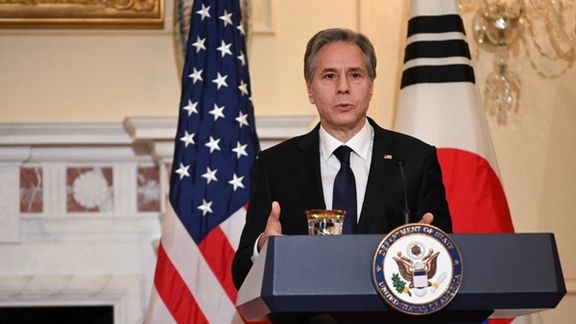Critics And Supporters Of JCPOA Say Biden's Iran Policy Has Failed

Antony Blinken, while lauding the 2015 Iran nuclear deal Monday, warned that Iranian actions to limit UN monitoring efforts might close the door to its revival.

Antony Blinken, while lauding the 2015 Iran nuclear deal Monday, warned that Iranian actions to limit UN monitoring efforts might close the door to its revival.
Separately, he also said the US will “cooperate” with Israel to stop Iran weaponizing.
In a joint press conference Monday with South Korean foreign Minister Park Jin the United States Secretary of State praised the 2015 deal – the JCPOA (Joint Comprehensive Plan of Action) – as “the most comprehensive and complete monitoring and inspections regime of any arms control agreement yet put in place.”
At the same time, Blinken voiced concern over Iran’s negotiating tactics in the stalled Vienna talks. “But what we’ve seen is Iran continuing to try to inject extraneous issues into the conversation, into the negotiation, that simply have no place there.”
Referring to year-long talks between Iran and world powers to revive the 2015 agreement, Blinken said that “a lot of work went into seeing if we could return to mutual compliance with the JCPOA” but “it is fundamentally up to Iran to decide whether or not it wishes to re-engage.”
The Biden administration came into office committed to restoring the JCPOA, from which President Donald Trump withdrew the US in 2018 calling the deal “the worst in history.” Trump’s ‘maximum pressure’ pressure sanctions on Iran were followed in 2019 with Tehran expanding its nuclear program beyond JCPOA limits, a move that accelerated after the election of Joe Biden.
Cooperation with Israel
In a video address to the American Jewish Congress Forum delivered Monday, Blinken said “we are continuing our close coordination with our Israeli partners to prevent Iran from developing” a nuclear weapon.
This came with claims in the New York Times that Israel, which opposes the JCPOA, had poisoned two Iranian scientists, Ayoub Entezari and Kamran Aghamolaei, who were in May reported dead from food poisoning.
The November 2021 killing of scientist Mohsen Fakhrizadeh, which outraged the Iranian parliament and led it to pass legislation expanding Iran’s nuclear program, was widely attributed to Israel, as were four killings and one attempted murder 2010-12.
“We have shifted into a higher gear,” Israeli Prime Minister Naftali Bennett said last week at a meeting of parliament’s defense and foreign affairs committee. “We are acting at all times and places, and we will continue to do so.”
Israel has also been carrying out widespread military drills reported by the Israeli media as simulating attacks on Iran.
Biden criticized from both sides
The Biden administration’s approach has led to nervousness in the European Union, which has led efforts to keep open a diplomatic path with Tehran and it concerned over what is perceived as lethargy in the face of Israeli saber-rattling.
In the US, criticism of the US administration’s approach has been growing as the Iranian nuclear program continues to expand under reduced monitoring by the United Nations’ International Atomic Energy Agency (IAEA).
At the beginning of June, Robert Menendez, chair of the Senate’s Foreign Relations Committee, said “hope is not a national security strategy” and more recently that restoring the JCPOA was not in US interests. Menendez called for a “comprehensive strategy” over Iran.
Supporters of the JCPOA agree Biden’s approach has failed. The president had “ruled out the symbolic concession that would be most likely to break the months-long diplomatic impasse [taking Iran’s Revolutionary Guards off the US list of ‘foreign terrorist organizations,’ reportedly an issue in talks],” Ryan Costello, policy director of the National Iranian American Council, wrote in a piece published June 9.
But opponents of making concessions to Iran say removing the IRGC from the US terror list is not a symbolic act at all, as the military-intelligence outfit actively pursues a policy to harm Americans and allies.